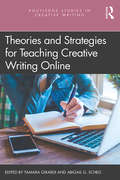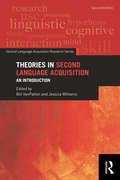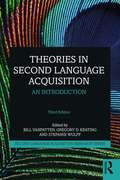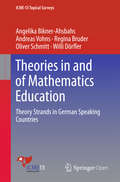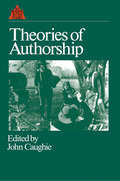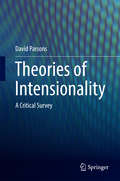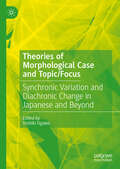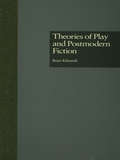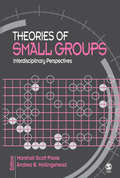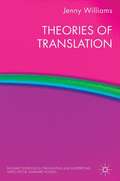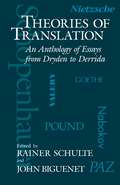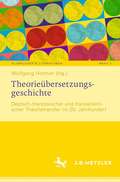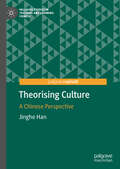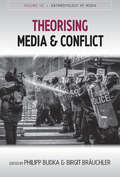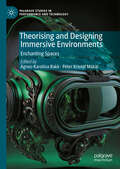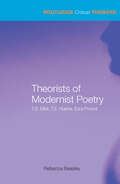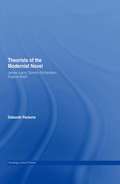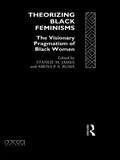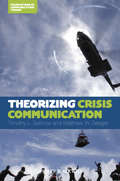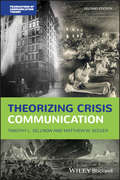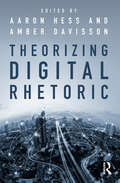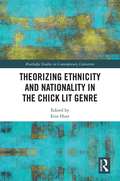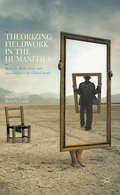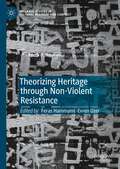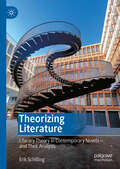- Table View
- List View
Theories and Strategies for Teaching Creative Writing Online (Routledge Studies in Creative Writing)
by Tamara GirardiAs the online world of creative writing teaching, learning, and collaborating grows in popularity and necessity, this book explores the challenges and unique benefits of teaching creative writing online. This collection highlights expert voices who have taught creative writing effectively in the online environment, to broaden the conversation regarding online education in the discipline, and to provide clarity for English and writing departments interested in expanding their offerings to include online creative writing courses but doing so in a way that serves students and the discipline appropriately. Interesting as it is useful, Theories and Strategies for Teaching Creative Writing Online offers a contribution to creative writing scholarship and begins a vibrant discussion specifically regarding effectiveness of online education in the discipline.
Theories in Second Language Acquisition: An Introduction (2nd Edition)
by Jessica Williams Bill VanPattenThe second edition of Theories in Second Language Acquisition seeks to build on the strengths of the first edition by surveying the major theories currently used in second language acquisition research. This volume is an ideal introductory text for undergraduate and graduate students in SLA and language teaching. Each chapter focuses on a single theory, written by a leading scholar in the field in an easy-to-follow style – a basic foundational description of the theory, relevant data or research models used with this theory, common misunderstandings, and a sample study from the field to show the theory in practice. This text is designed to provide a consistent and coherent presentation for those new to the field who seek basic understanding of theories that underlie contemporary SLA research. Researchers will also find the book useful as a "quick guide" to theoretical work outside their respective domains.
Theories in Second Language Acquisition: An Introduction (Second Language Acquisition Research Series)
by Bill VanPatten Stefanie Wulff Gregory D. KeatingThis third edition of the best-selling Theories in Second Language Acquisition surveys the major theories currently used in second language acquisition (SLA) research, serving as an ideal introductory text for undergraduate and graduate students in SLA and language teaching. Designed to provide a consistent and coherent presentation for those seeking a basic understanding of the theories that underlie contemporary SLA research, each chapter focuses on a single theory. Chapters are written by leading scholars in the field and incorporate a basic foundational description of the theory, relevant data or research models used with this theory, common misunderstandings, and a sample study from the field to show the theory in practice. New to this edition is a chapter addressing the relationship between theories and L2 teaching, as well as refreshed coverage of all theories throughout the book. A key work in the study of second language acquisition, this volume will be useful to students of linguistics, language and language teaching, and to researchers as a guide to theoretical work outside their respective domains.
Theories in and of Mathematics Education
by Angelika Bikner-Ahsbahs Andreas Vohns Regina Bruder Oliver Schmitt Willi DörflerThis survey provides an overview of German meta-discourse on theories and mathematics education as a scientific discipline, from the 1970s to the 1990s. Two theory strands are offered: a semiotic view related to Peirce and Wittgenstein (presented by Willibald Dorfler), and the theory of learning activity by Joachim Lompscher (presented by Regina Bruder and Oliver Schmitt). By networking the two theoretical approaches in a case study of learning fractions, it clarifies the nature of the two theories, how they can be related to inform practice and renew TME-issues for mathematics education as a scientific discipline. Hans-Georg Steiner initiated the first of five international conferences on Theories of Mathematics Education (TME) to advance the founding of mathematics education as a scientific discipline, and subsequently German researchers have continued to focus on TME topics but within various theory strands. "
Theories of Authorship
by John CaughieThe film director or `auteur' has been central in film theory and criticism over the past thirty years. Theories of Authorship documents the major stages in the debate about film authorship, and introduces recent writing on film to suggest important ways in which the debate might be reconsidered.
Theories of Intensionality
by David ParsonsThis book offers a comprehensive primer for the study of intensionality. It explores and assesses those key theories of intensionality which have been developed in the twentieth and early twenty-first centuries. Each of the examined theories is tested as to whether it can account for the problems associated with (A) the intersubstitution salva veritate of co-extensional expressions, and (B) existential generalisation. All of these theories are subsequently compared so as to determine which of them comes closest to successfully solving these problems. The book examines four kinds of intensionalist approaches: the Fregean approach (including Church's formalisation of Frege's theory); the possible-worlds approaches of Carnap, Montague and Cresswell; the theory of properties relations and propositions devised by Bealer; and the Meinongian approaches put forward by Zalta and Priest. The book also proposes an alternative to intensionalism: sententialism. Sententialists argue that the problems of intensionality could be solved by appealing to linguistic items (usually sentences) rather than intensional entities. Drawing on the works of Quine, Davidson, Scheffler and R. M. Martin, it explores the viability and value of sententialism as an alternative to intensionalism.
Theories of Morphological Case and Topic/Focus: Synchronic Variation and Diachronic Change in Japanese and Beyond
by Yoshiki OgawaThis edited book brings together studies on morphological case in Japanese, English, and Bantu languages, among others, from morphosyntactic, semantic and historical perspectives. Languages are divided into two types in terms of case: nominative-accusative languages and ergative-absolutive languages. Even if we limit our attention to nominative-accusative languages, morphological case on subjects and objects can vary across languages or even within a single language, either synchronically or diachronically. For instance, certain stative predicates in Japanese allow their subjects and objects to be marked with dative and nominative case, respectively, and subjects in adnominal clauses in Japanese can be marked with genitive case; moreover, genitive subject marking in adnominal clauses has decreased over the past few centuries. Licensing relationships between predicates and cases can also have idiolectal, dialectal, and/or geographical micro-variations and intergenerational and/or diachronic micro-change. This book draws parallels and examines differences between examples of European, Asian and African languages, and discusses whether and how licensing of certain morphological cases (especially, subject marking) is related to the grammatical functions such as Topic and Focus. It will be of interest to researchers in Theoretical Linguistics, particularly those involved with Language Variation and Change, Linguistic Typology, Morphology and Syntax, and Generative Grammar.
Theories of Play and Postmodern Fiction (Comparative Literature and Cultural Studies #3)
by Brian EdwardsDrawing on developments in critical theory and postmodernist fiction, this study makes an important contribution to the appreciation of playforms in language, texts, and cultural practices. Tracing trajectories in theories of play and game, and with particular attention to the writings of Nietzsche, Wittgenstein, Bakhtin, and Derrida, the author argues that the concept of play provides perspectives on language and communication processes useful both for analysis of literary texts and also for understanding the interactive nature of constructions of knowledge.
Theories of Small Groups: Interdisciplinary Perspectives
by Marshall Scott Poole Andrea B. HollingsheadTheories of Small Groups: Interdisciplinary Perspectives brings together the threads that unify the field of group research. The book is designed to define and describe theoretical perspectives on groups and to highlight select research findings within those perspectives. In this text, editors Marshall Scott Poole and Andrea B. Hollingshead capitalize on the theoretical advances made over the last fifty years by integrating models and theories of small groups into a set of nine general theoretical perspectives. Theories of Small Groups is the first book to assess, synthesize, integrate, and evaluate the body of theory and research on small groups across disciplinary boundaries.
Theories of Translation
by Jenny WilliamsPresents the most important theories in Translation Studies that have emerged over the last 50 years. Particularly innovative is the inclusion of theories from outside North America and Europe, theoretical perspectives on recent technological developments and a consideration of the nature of theory in the field.
Theories of Translation: An Anthology of Essays from Dryden to Derrida
by Rainer Schulte and John BiguenetSpanning the centuries, from the seventeenth to the twentieth, and ranging across cultures, from England to Mexico, this collection gathers together important statements on the function and feasibility of literary translation. The essays provide an overview of the historical evolution in thinking about translation and offer strong individual opinions by prominent contemporary theorists. Most of the twenty-one pieces appear in translation, some here in English for the first time and many difficult to find elsewhere. Selections include writings by Scheiermacher, Nietzsche, Ortega, Benjamin, Pound, Jakobson, Paz, Riffaterre, Derrida, and others. A fine companion to The Craft of Translation, this volume will be a valuable resource for all those who translate, those who teach translation theory and practice, and those interested in questions of language philosophy and literary theory.
Theorieübersetzungsgeschichte: Deutsch-französischer und transatlantischer Theorietransfer im 20. Jahrhundert (Globalisierte Literaturen. Theorie und Geschichte transnationaler Buchkultur / Globalized Literatures. Theory and History of Transnational Book Culture #2)
by Wolfgang HottnerIm Zuge der Historisierung von Theorie ist die Rolle von Übersetzungen sowie die vermittelnde Rolle der Übersetzer*innen bisher nur am Rande berücksichtigt worden. Doch für die Rezeption, Internationalisierung und Kanonisierung von Theorie spielen diese eine entscheidende Rolle, weshalb sich dieser Band der Geschichte der Theorie in Hinblick auf ihre Übersetzungen nähert. Die Brisanz, die Theorie in Deutschland, Frankreich und den USA von Anfang der 1960er bis Ende der 1990er Jahre entfalten konnte, verdankt sich nicht nur der Mobilität ihrer Protagonist*innen, sondern auch der Verfügbarkeit von Übersetzungen, in denen Theorie von einer Sprache in die andere übergeht, dabei ‚anschlussfähig‘ wird. Theorieübersetzungsgeschichte rückt die Arbeit von Übersetzer*innen in den Blick, die wechselseitige Beziehung von Übersetzungstheorie und poststrukturalistisch-dekonstruktivem Denken sowie ein spezifisches Verständnis von Übersetzung, das mit dem Anspruch verbunden ist, im Verlauf gegenwärtiger Debatten zu intervenieren.
Theorising Culture: A Chinese Perspective (Palgrave Studies in Teaching and Learning Chinese)
by Jinghe HanThis book seeks for an alternative perspective in analysing cultural phenomena to supplement the norm of Western dominant theorising and conceptualisation. It engages notions and concepts of culture developed by Chinese cultural theorists when addressing Chinese teachers’ cross-cultural experiences in Australian school settings. This alternative approach acknowledges the fact that the generation and development of cultural theories is contextually based. Through the reciprocated theory-data examination, it enables the arguments: Chinese culture is rooted in its written language (hanzi) which makes culture inseparable from language teaching; the core of the culture is linked back to, streamlined with and continues from China’s elongated history; this core has been consistently influential on these teachers’ practices and the observable cultural shift in them could be non-genuine mimicry for survival. Document analysis witnesses the current political push for the culture’s stability and continuity through the national education system across sectors. This book provides background information for teachers with cultural backgrounds different from their students’, and draws on a bank of practice-based evidence to suggest ways to enhance teacher-student relationships in cross-cultural settings.
Theorising Media and Conflict (Anthropology of Media #10)
by Birgit Bräuchler Philipp BudkaTheorising Media and Conflict brings together anthropologists as well as media and communication scholars to collectively address the elusive and complex relationship between media and conflict. Through epistemological and methodological reflections and the analyses of various case studies from around the globe, this volume provides evidence for the co-constitutiveness of media and conflict and contributes to their consolidation as a distinct area of scholarship. Practitioners, policymakers, students and scholars who wish to understand the lived realities and dynamics of contemporary conflicts will find this book invaluable.
Theorising and Designing Immersive Environments: Enchanting Spaces (Palgrave Studies in Performance and Technology)
by Ágnes-Karolina Bakk Péter Kristóf MakaiThis edited volume discusses the topic of immersion, approaching it from the perspective of various media and stakeholders: experiencers and creators. While the concept of immersion has gained widespread currency in the last decades beyond video games, its critical theory has not reached the same momentum, meaning that there is no unified way of using the term. This causes many misunderstandings and stands as an obstacle to successful expectation management processes, especially in the entertainment industry. This book presents a nuanced platform of discussion to answer the question of how immersion can manifest itself in different media, and how creators are embracing the current trends within the experience economy.
Theorists of Modernist Poetry: T.S. Eliot, T.E. Hulme, Ezra Pound (Routledge Critical Thinkers)
by Rebecca BeasleyModernist poetry heralded a radical new aesthetic of experimentation, pioneering new verse forms and subjects, and changing the very notion of what it meant to be a poet. This volume examines T.S. Eliot, T.E. Hulme and Ezra Pound, three of the most influential figures of the modernist movement, and argues that we cannot dissociate their bold, inventive poetic forms from their profoundly engaged theories of social and political reform. Tracing the complex theoretical foundations of modernist poetics, Rebecca Beasley examines: the aesthetic modes and theories that formed a context for modernism the influence of contemporary philosophical movements the modernist critique of democracy the importance of the First World War modernism’s programmes for social reform. This volume offers invaluable insight into the modernist movement, as well as demonstrating the deep influence of the three poets on the shape and values of the discipline of English Literature itself. Theorists of Modernist Poetry is relevant not only to students of modernism, but to all those with an interest in why we study, teach, read and evaluate literature the way we do.
Theorists of the Modernist Novel: James Joyce, Dorothy Richardson and Virginia Woolf (Routledge Critical Thinkers)
by Deborah ParsonsTracing the developing modernist aesthetic in the thought and writings of James Joyce, Dorothy Richardson and Virginia Woolf, Deborah Parsons considers the cultural, social and personal influences upon the three writers. Exploring the connections between their theories, Parsons pays particular attention to their work on: forms of realism characters and consciousness gender and the novel time and history. An understanding of these three thinkers is fundamental to a grasp on modernism, making this an indispensable guide for students of modernist thought. It is also essential reading for those who wish to understand debates about the genre of the novel or the nature of literary expression, which were given a new impetus by the pioneering figures of Joyce, Richardson and Woolf.
Theorizing Black Feminisms: The Visionary Pragmatism of Black Women
by Stanlie M. James Abena P. A. BusiaFirst published in 1993. Routledge is an imprint of Taylor & Francis, an informa company.
Theorizing Crisis Communication
by Matthew W. Seeger Timothy L. SellnowTheorizing Crisis Communication presents a comprehensive review and critique of the broad range of theoretical frameworks designed to explain the role of communication in the development, management, and consequences of natural and man-made crises.Brings together the variety of theoretical approaches emerging in the study of crisis communication into one volume for the first time.Summarizes theories from such diverse perspectives as rhetoric, risk management, ethics, mass communication, social media, emergency response, crisis outcomes, and warning systems, while presenting clear examples of how the theory is applied in crisis communication researchPresents theoretical frameworks generated by research from many disciplines including sociology, psychology, applied anthropology, public health, public relations, political science, organizational studies, and criminal justiceAn essential tool for a comprehensive understanding of the onset, management, response, resolution, and ultimate meaning of these devastating world events
Theorizing Crisis Communication (Foundations of Communication Theory Series)
by Matthew W. Seeger Timothy L. SellnowExplore the major theories within crisis communication, fully revised and updated Theorizing Crisis Communication provides a comprehensive and state-of-the-art review of both current and emerging theoretical frameworks designed to explain the development, management, and consequences of natural and human-caused crises. A critique of the many theoretical approaches of crisis communication, this volume provides readers with an in-depth understanding of the management, response, resolution, and significance of failures in corporate responsibility, as well as destructive global events such as pandemics, earthquakes, hurricanes, tsunamis, chemical spills, and terrorist attacks. This second edition contains new theories from related subfields and updated examples, references, and case examples. New chapters discuss metatheoretical considerations and theoretical advancements in the study of social media. Throughout the text, the authors highlight similarities, patterns, and relationships across different crisis types and offer insight into the application of theory in the real world. Integrating work from organizational studies, social sciences, public relations, and public health, this book: Covers a broad range of crisis communication theories, including those relevant to emergency response, risk management, ethics, resilience and crisis warning, development, and outcomes Presents theoretical frameworks based on research disciplines including sociology, psychology, applied anthropology, and criminal justice Provides clear and compelling examples of application of theory in contexts such as rhetoric, mass communication, social media, and warning systems Offers a systematic and accessible presentation of topics by explaining each theory, describing its applications, and discussing its advantages and drawbacks Theorizing Crisis Communication, Second Edition, is the perfect textbook for advanced undergraduate and graduate students of crisis and risk communication, and an importance reference for scholars, researchers, and practitioners in fields including crisis communication, emergency management, disaster studies, sociology, psychology, and anthropology.
Theorizing Digital Rhetoric
by Aaron Hess Amber DavissonTheorizing Digital Rhetoric takes up the intersection of rhetorical theory and digital technology to explore the ways in which rhetoric is challenged by new technologies and how rhetorical theory can illuminate discursive expression in digital contexts. The volume combines complex rhetorical theory with personal anecdotes about the use of technologies to create a larger philosophical and rhetorical account of how theorists approach the examinations of new and future digital technologies. This collection of essays emphasizes the ways that digital technology intrudes upon rhetorical theory and how readers can be everyday rhetorical critics within an era of ever-increasing use of digital technology. Each chapter effectively blends theorizing between rhetoric and digital technology, informing readers of the potentiality between the two ideas. The theoretical perspectives informed by digital media studies, rhetorical theory, and personal/professional use provide a robust accounting of digital rhetoric that is timely, personable, and useful.
Theorizing Ethnicity and Nationality in the Chick Lit Genre
by Erin HurtScholars and readers alike need little help identifying the infamous Bridget Jones or Carrie Bradshaw. While it is no stretch to say that these fictional characters are the most recognizable within the chic lit genre, there are certainly many others that have helped define this body of work. While previous research has focused primarily on white American chick lit, Theorizing Ethnicity and Nationality in the Chick Lit Genre, takes a wider look at the genre, by exploring chick lit novels featuring protagonists from a variety of ethnic backgrounds set both within and outside of the US.
Theorizing Fieldwork in the Humanities: Methods, Reflections, and Approaches to the Global South
by Shalini Puri and Debra A. CastilloThis volume, the first of its kind, launches a conversation amongst humanities scholars doing fieldwork on the global south. It both offers indispensable tools and demonstrates the value of such work inside and outside of the academy. The contributors reflect upon their experiences of fieldwork, the methods they improvised, their dilemmas and insights, and the ways in which fieldwork shifted their frames of analysis. They explore how to make fieldwork legible to their disciplines and how fieldwork might extend the work of the humanities. The volume is for both those who are already deeply immersed in fieldwork in the humanities and those who are seeking ways to undertake it.
Theorizing Heritage through Non-Violent Resistance (Palgrave Studies in Cultural Heritage and Conflict)
by Feras Hammami Evren UzerThis book is about the entanglement of heritage and resistance in different situations of conflicts, and the opportunities this entanglement may provide for social justice. This entanglement is investigated in the different contributions through theoretical and empirical analyses of heritage-led resistance to neoliberal economic development, violation of the subaltern, authorised narratives and state-invented traditions, colonialism and settler colonialism, and even dominating discourses of social movement, to name just a few. Crossing the disciplinary boundaries of heritage and resistance studies, these analyses bring new insights into several timely debates, especially those concerned with the interrelated critical questions of displacement, gentrification, exclusion, marginalization, urbicide, spatial cleansing, dehumanization, alienation, ethnic cleansing and social injustice. Following our purposeful and future-driven approach, we wish to bring new energy to the field of heritage studies through the focus on the potential of heritage and resistance for hopeful change rather than adding to the field yet another overwhelming engagement with conflict and war.
Theorizing Literature: Literary Theory in Contemporary Novels – and Their Analysis
by Erik SchillingThis book offers an analytical model for the interpretation of theory-informed novels – American, English, French, German, and Italian – from the past 50 years. Works discussed include Laurent Binet’s The 7th Function of Language, Italo Calvino’s If on a Winter’s Night a Traveler, Patricia Duncker’s Hallucinating Foucault, Umberto Eco’s Foucault’s Pendulum, David Lodge’s Small World, and Juli Zeh’s Dark Matter. Erik Schilling shows how these works not only incorporate elements of theory in playful, intertextual ways, but productively work with theory – for instance, by elaborating the complexities of the roles of author and reader or by confronting the quest for meaning with an infinite network of signs. Schilling argues that the novels do not merely adopt theory; they create theory – and this theorizing literature requires new forms of interpretation.
